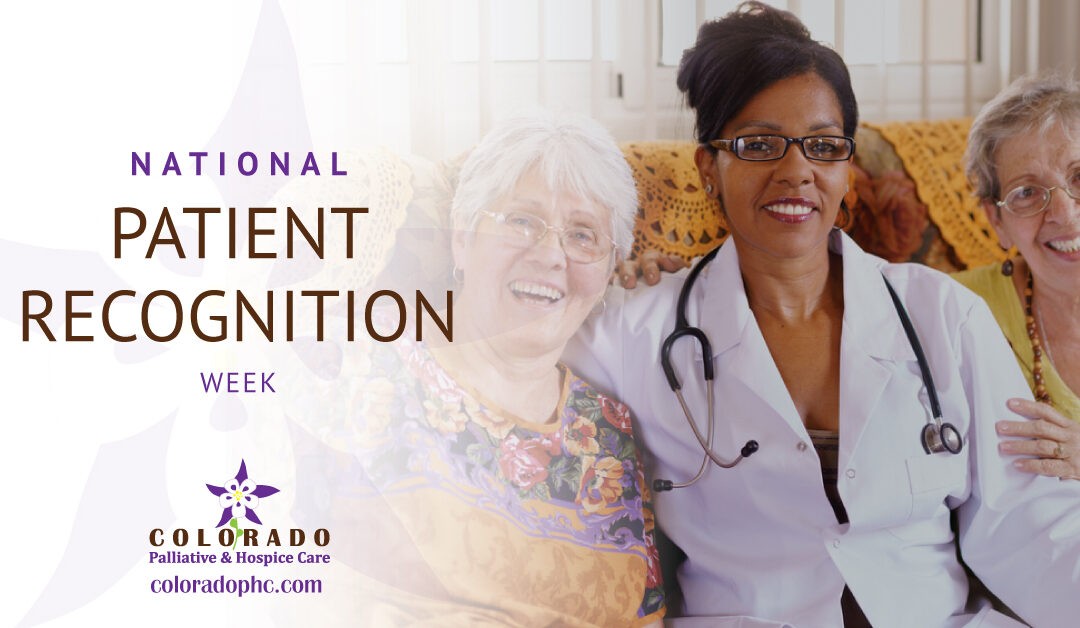This week, February 1-7, 2023, National Patient Recognition Week is taking place all over the country.
We’re celebrating Patient Recognition Week by focusing on the many wonderful people who make our work possible. First, we want to say a special “thank you” to all our patients and their families for letting us into your lives and sharing your stories. We couldn’t do what we do without you, and we are so excited to hear more about the amazing things you have going on in your lives.
National Patient Recognition Week is a time for all healthcare professionals to recommit themselves to service excellence and celebrate their extremely vital role in our society. This week also honors the commitment of healthcare professionals and institutions who look for ways to improve the care delivered to their patients.
As end-of-life professionals, we’re taking the time at every patient visit to recognize the many ways patients are more than just patients. They’re people—people who deserve respect and care, but also people who can still make a difference in the world.
We’re celebrating Patient Recognition Week with this special post about how you can celebrate this week and the ways hospice care and palliative care can help patients and their families improve quality of life and feel more at ease.
History
John O’Malley initiated National Patient Recognition Week in 1995 after he felt the need to specially dedicate a week to the many patients healthcare workers look after each day. Patients are not only the people we treat; they’re also the people who teach us how to treat each other better and be better people.
How to Celebrate
Patient Recognition Week is a chance to show appreciation for our patients and their families. It’s also a chance to say “thank you” in whatever way feels best for you. Here are some ideas:
- Have a patient appreciation day: Your patients are the reason you have a job, so remember to thank them! It’s an excellent opportunity to let them know how much you appreciate them and the work they do.
- Give your favorite patient a gift: You’ll never forget that one person who stood out among all the rest, so why not give them something special this week?
- Make it a family affair: Take some time off from work and make it a family event. The whole family will appreciate the chance to spend more time together!
- Show your appreciation for nurses by thanking them for all their hard work throughout the year. Nurses often need to be more appreciated, so this is a great way to show how much you care about them.
- Host a party at your office or home with your team and the patients and families you work with most often. Invite everyone over for food and drinks, maybe even music!
- Make a day out of it by taking them out for lunch or dinner at their favorite restaurant—or even grab some fast food if that’s what they want! Just be sure to let them pick where they go, so they feel included in the celebration.
- Perform service projects together, like cleaning up trash in an area where there might be a lot of litter or picking up litter along streets.
We hope you will take some time this week to thank someone, a patient or healthcare worker, who has made a difference in your life.
How Hospice and Palliative Care Can Help
We know that taking care of a loved one in the final stages of life can be incredibly stressful, and we want to remind you that there are resources to help you through this time.
Hospice care is designed to provide comfort, support, and pain management for patients with an illness or condition that is expected to result in death. Palliative care is similar but focuses on improving quality of life for people with serious illnesses or chronic conditions.
Hospice and palliative care also offer emotional support for caregivers and family members as they navigate this difficult journey. You’ll often hear stories about how hospice workers helped people find peace after years of suffering—even when it seemed impossible—and how those same workers were able to help families cope with loss when their loved ones passed away.
In addition to helping patients live their best lives during a terminal illness, hospice workers also work with families grieving the loss of someone they love dearly. They can provide counseling services and support groups for patients, friends, and family members.
Hospice and palliative care are provided by specially trained nurses, doctors, social workers, counselors, and other professionals working together to provide the best possible quality of life for their patients.
If you have any questions about hospice care, palliative care, or how we can help you and your loved ones, please don’t hesitate to reach out.

